China Dolls Read online
Page 2
“Yeah. You don’t have one. You’ve got to stop talking all perfect. You need to do the ching-chong thing.”
Never! My father spoke in heavily accented English, even though he was born here. He always blamed it on the fact that he’d grown up in a lumber camp in the Sierras, where he lived with his father, who conversed only in Chinese. My mother’s English was flawless. She was born in China but came to America so early that she’d lost her accent entirely. How she was raised—somehow living far enough from other Chinese that she didn’t have an accent—was never discussed. The one time I asked, my father smacked me. In any case, the three of us could understand each other only if we communicated in English. And even if we all had spoken the same dialect, my father would never have allowed us to use it. Speaking English means you are American, and we must be American at all times. Reciting sentences like I hear you cut school again and what’s the big deal? showed we were assimilated. But all that didn’t mean Dad wouldn’t exaggerate his accent for his customers if he calculated it would make them happy.
“I’m sorry,” I said. “But I can’t do what you ask.”
With nothing left to add, I got up to leave. In just these few minutes I’d learned two things about myself: I would never lower myself by faking an accent like my dad did (or Charlie Chan did in the movies), nor would I work naked as a hoochie-coochie dancer. All right, so I had pride. But what price would I have to pay for it? I felt sick with fear and despair.
“Hey, kid, wait a sec.” The man reached into a drawer, pulled out a brown paper bag, and then met me at the door. “A ham sandwich and an apple.”
Heat crept up my face. I already hadn’t gotten the job. Did he have to humiliate me further? Did I appear that down at the heels?
“Take it,” he said, pressing the bag into my hands. “From the wife and me.”
“Thank you.” It would be my first real meal since leaving home.
He gave me a last pitying look. “Have you tried the new nightclubs in Chinatown? I hear they’re looking for ponies and canaries.” Seeing my confused expression, he explained, “I’m talking about dancers and singers—ponies and canaries. Aw, don’t worry about it. You’ll learn soon enough. Now head on back to your side of town. Ask anyone. They’ll tell you where to go to find an audition.” He gave me a gentle push out the door and called, “Next.”
On my way back to the dock, I conjured a nightclub in my mind. Top Hat, Swing Time, and A Star Is Born all had nightclubs, so I knew just what they looked like: white banquettes, hatcheck and cigarette girls, champagne bubbling in thin-stemmed glasses, men wearing top hats, white ties, and tails, and women swanning about in satin slip gowns cut on the bias that draped over their bodies like whispered kisses. My heart had been set on getting a job at the exposition, but working in a nightclub would be even better. A dollop of confidence: I will succeed.
But I still didn’t have an inkling about where Chinatown was or where to look once I got there, and that knowledge brought on a horrible wave of anxiety that all but drowned my momentary optimism. For now, I had nowhere to go except back to my hotel room. I already hated that place, with its cockroaches, women with their too-rouged cheeks, and men in their dirty undershirts who came and went, but I wouldn’t give up. I couldn’t give up, because that would mean going home to my father.
THE NEXT DAY, I put on my same rose-colored dress, bought a map, and followed its lines toward Chinatown. The clammy air was depressing. Passing all the soup lines and people—Okies, I guessed—dressed in tattered clothes, gaunt, just standing around, didn’t help either. I could end up like them if I wasn’t careful. And my body ached from the damp. My ribs and shoulder throbbed when I breathed or raised my arms, but I reminded myself that I’d danced through pain more times than I could count. I swallowed three aspirin dry and silently prayed that I wouldn’t have to do a ton of turns if I got an audition, which would be nearly impossible with my lingering vertigo.
At the corner of California Street and Grant Avenue, two peculiar-looking multiple-storied edifices with green-glazed tile roofs sat like guards: Sing Chong Bazaar and Sing Fat Bazaar. What crazy names! Behind the big plate-glass windows were things I’d never seen before: Chinese furniture, silks, and vases. Then I turned onto Grant and into another world. Coiling dragons painted in bright green, red, and gold decorated the streetlamps. Eaves curled skyward. I passed markets with produce stacked in baskets right on the sidewalk and restaurants advertising chop suey—whatever that was. And the smells! I couldn’t tell if they were good or bad—just odd.
But nothing unnerved me more than encountering so many Chinese eyes, mouths, noses, arms, and legs. Here were hundreds—maybe thousands—of Chinese men. They were tall and short, fat and thin, some light-skinned and some very dark. None of them looked like my father. I spotted a couple of older women, moving furtively along the sidewalk, doing their best to be invisible. Farther along, I saw five high school girls, wearing matching uniforms and carrying books. My knowledge of Chinese hair was limited to three examples: my mother’s tresses, which she kept in a bun; my father’s close-shaved head; and my own manufactured curls. So even the hair was different—long and silky, short bobs, permanent waves, marcels, spiky, wispy, balding, and in so many variations of black. Everything was as foreign and strange as if I’d just disembarked from a boat in Hong Kong, Canton, or Shanghai—not that I’d been to any of those places—making me both elated and petrified. Chinatown felt frighteningly enchanted in the way certain fairy tales had once left me unable to sleep. Was that why my parents had insisted on living so far from all this?
I needed help.
“Can you direct me to a nightclub?” I asked a woman wearing what looked like black pajamas and carrying two bags overflowing with onion greens. She refused to acknowledge me. Next I tried to stop a newspaper boy, but he ignored me too. I gazed up the street: so many men here—some dressed as laborers, others as businessmen. Everyone seemed to be in a hurry, moving much faster than folks ever did back home, except for that time the Smith house caught fire and we all rushed to watch the volunteer fire department try to put it out. Now that was a night.
At the corner of Grant and Washington, I found three boys I guessed to be between ten and twelve years old playing in a sandpile dumped in the middle of the intersection. Their pants were rolled up to their knees, their sleeves smashed to their elbows, and their caps askew from roughhousing. Workmen shoveled the perimeter of the pile as cars and trucks honked at the traffic obstacle as though the added noise would cure the problem. I watched it all from the curb for a few minutes. Finally, I stepped into the street. My shoes sank into the sand as I delicately made my way to the little trio, who stopped their horseplay to watch me approach. The oldest boy grabbed two handfuls of sand and let the grains flow through his fingers.
“No one said we couldn’t be out here,” he said by way of greeting.
“I didn’t say they did,” I replied.
“Then what do you want, lady?”
My face crinkled. I’d never been called lady before. Measly girl. Hog face. Chink. Chinaman. Little one. Apple-pie winner. Heart dumpling. Kid and China doll just yesterday, but never lady. Act the part!
“I’m hoping you can assist me,” I said.
“What’s in it for us?” the oldest boy asked impudently.
“A nickel each, if you help me.” I pulled out my coin purse, picked through it for three nickels, and held them in my palm. “I’m looking for a nightclub—”
“Oh,” he said, his voice rising and falling knowingly. “Won’t you get in trouble?”
I dropped one of the nickels back into the coin purse.
“So you’re familiar with the clubs,” I said. Every boy was curious about the forbidden, and my comment set off all three boys.
“They’re barely better than bars—”
“No one wants them in the neighborhood—”
“My dad says they’re just a rat’s hair above a speakeasy—”
> I dropped another nickel into my coin purse.
“You win, lady,” the ringleader conceded. “You want to work in a big-thigh show, that’s your headache.”
“Big-thigh show?”
“Don’t you know anything?” he asked. “You really want to let people see your legs?”
As long as it’s just my legs …
“Please tell me where to go,” I said.
I waited while he exchanged looks with his buddies. All I needed was one name to give me a start.
At last, he said, “Wilbert Wong has the Li Po—a cocktail lounge on the next block. He’s changing it into more of a club. Andy Wong—not related—runs the Chinese Penthouse. It opened last December with all-Chinese entertainment.”
He rattled this off like a town booster. This place was turning out to be a lot more like Plain City than it looked on the surface: a small town, where everyone knew everyone else’s business, especially when it came to the taboo.
“I heard Andy Wong is going to change the name to the Sky Room,” the smallest boy ventured, which earned him an elbow to the ribs.
“There’s Charlie Low’s new club. It’s not even open yet,” the oldest boy continued. “Two years ago, he opened a bar here on Grant Avenue. No Chinese girls or women allowed. What am I saying? No Chinese went, period!”
“How would you know?” I asked, challenging him.
“I know,” he responded.
Any boy could spout off about the birds and the bees—and other naughty things—but he often got the details wrong. It would now be up to me to figure out how much of what this little boy said was accurate and how much was gobbledygook picked up from listening to the whispers of older kids.
“Charlie Low’s wife is a singer,” he continued, “and he’s giving her a showplace called the Forbidden City. It’s on Sutter Street—”
“Not even in Chinatown,” the smallest boy interrupted again.
That appealed to me, because Chinatown was too scary for me.
“Can you point the way?” I asked.
“First, you go …”
His voice trailed off, and his eyes widened. The other two boys stared gape-mouthed at something over my shoulder. I turned to see what they were ogling and saw a girl about my age gingerly step off the curb and come toward us. She wore a practical outfit: a gray wool pleated skirt, a long-sleeved black sweater, charcoal-gray wool stockings, and oxfords. She was Chinese, with flawless porcelain skin. She looked rich, like out of a movie, except that I’d never seen a Chinese who looked like her in the darkness of the Rialto.
“I know how to get to the Forbidden City,” she said in melodious voice. “I’ll take you.”
Although Joe and the man on Treasure Island had both been perfectly nice to me, I wasn’t accustomed to kindness. Now here was a girl, offering to help, as if magically sent. I glanced down at the boys, trying to get a sense of what I should do.
“She’s Helen Fong,” the ringleader said in awe. “If she wants to help you, let her!”
The other two boys, acting their young ages at last, covered their mouths and giggled. The girl named Helen gave them an unyielding look, and they went quiet but fast.
“Kew, Chuen, Yee, I don’t think your mothers will be too happy to hear you aren’t in school,” she observed coolly. “You’d better hurry along now.”
The boys stood and brushed the sand off themselves. When they held out their palms, I paid them their promised nickels. Once they scampered off, I turned to Helen.
“Where to?”
HELEN
Calling to the Heavens
“This way,” I answered, but what in the world was I thinking—skipping work, walking through Chinatown unescorted, and talking to a total stranger?
My pace was brisk, and I felt the girl wordlessly tagging along behind me as I wove down Grant. She caught up at a red light.
“My name’s Grace,” she said.
“Nice to meet you.”
“Thanks so much for helping me,” she went on, trying to appear composed, I thought, but actually sounding as scared as a fawn panting in fear at the sight of the moon.
“It’s nothing,” I responded, but it was everything. This morning, my brother Monroe had walked me to the door of the Chinese Telephone Exchange, where I worked. After he left me, I’d simply stood there, unable to bring myself to enter the building. I couldn’t face another day of listening to the other women talk between calls about what they were going to make for dinner that night for their husbands, how clever their children were, or how hard it was to make ends meet. Those women just weren’t pleasant to me. I understood, I suppose. I earned the same five dollars a week they earned and gave every dime to my father for my “upkeep,” but everyone knew my family was one of the best and most important in Chinatown.
So there I’d been, outside the telephone exchange, daydreaming about how the thousands of women—wives and concubines—in China’s imperial court had once spent their entire lives hidden inside the walls of the palace with no family or friends to love them. To amuse themselves, the women used to catch crickets and keep them in cages near their pillows. The crickets’ songs—haunting, calling to the heavens of their loneliness—told not only of their own lives but also of the women who were cared for, but equally helpless, in the cage of the palace. I lived in a traditional Chinese compound right in the heart of Chinatown, with twenty-nine of my closest relatives. A sense of futility had nearly overwhelmed me as I realized my life wasn’t all that different from those of the crickets who belonged to the women, who, in turn, belonged to the emperor. Right then, I’d noticed the girl in the street, talking to those silly boys. She looked as lost and lonely as I felt. She wasn’t fresh off the boat from China, but she was new to town, of that I was certain—a country bumpkin in her tatty store-bought dress. I’d edged to the intersection. As I’d listened to her conversation with the boys … I don’t know … I felt compelled to help her.
Once Grace and I were clearly out of Chinatown, my spirits lifted. No one from the neighborhood was watching me, hoping to curry favor with my father by reporting on my actions. We crossed the street, turned right on Sutter, and continued until we reached a sign that read FORBIDDEN CITY AUDITIONS. NO EXPERIENCE NEEDED. Music wafted down the stairs, enveloping us right on the street.
“Here it is,” I said.
“Come with me. Try out with me.”
I shook my head. “I can’t. I’ve never had a dance lesson.”
“It says no experience needed. We’ll stick together. I promise.”
Before I could protest further, Grace took my hand. I never would have expected that from a Chinese girl. I shivered. Didn’t she know it was rude to touch like that? I guess not, because she gave me an encouraging smile and pulled me up the stairs. I had leapt so far out of my cage—out of myself—that I followed Grace like I was the one who was lost and she was now leading the way. Or maybe she was desperate and afraid to go in alone.
In the entry hall, workers—dressed in baggy pants, sleeveless undershirts, and painters’ caps—carried lumber and other construction materials. A Chinese woman, sitting at a table made from two-by-fours and a sheet of plywood, handed us forms with spaces for our names, heights, weights, and ages. I wrote down the address of my family’s compound. I glanced over Grace’s shoulder as she scribbled the name of a hotel in a seedy part of town.
The woman, who I was sure recognized me, took Grace’s form and scanned it. “You’re seventeen?” she asked, not bothering to look up.
“Is that all right?”
“We’ve got younger inside. We just don’t want you to be too young.” She pointed down the hall. “You can change in that room on the right. After that, sit with the other girls trying out today. They’ll call you when they’re ready.” She didn’t specify who “they” were.
I lingered by the table when Grace walked down the hall.
“If I get the job, how much will you pay?” I inquired.
“Twenty a week,” the receptionist answered. I could almost hear additional words pouring out of her mouth. As though you need it. Then she bent back to her paperwork.
I could have walked out right then, but I was intrigued. Maybe I could do this. I traced the path Grace had taken and entered the half-finished ladies’ room. She had changed into a soft pink one-piece playsuit with short puffed sleeves and little shorts.
“I made this,” she boasted, “after I saw Eleanor Powell wear something like it in Born to Dance. I couldn’t tell the color of the playsuit in the film, but I thought this fabric would look pretty against my skin.”
I hadn’t been to many movies, so I didn’t know what to say.
She glanced in the mirror, squished her curls a couple of times to perk them up, and covered a cut with lipstick. I’d never be so rude as to ask her what had happened, but then she turned in my direction, frowned, and asked me a totally inappropriate question.
“You don’t know how to doll up, do you?” she said with a laugh. She poked around in her bag and fished out a slippery thin pink hair ribbon, which she tucked between her lips. She turned me toward the mirror, ran her fingers through my hair, and then whisked the ribbon from her lips, passed it behind my neck, and pulled the satin strips to the top of my head, where she tied a bow. “That’s better!” And it was, because the pink lifted my cheeks’ natural color.
We exited the restroom and followed the sound of music and rhythmic tapping. At the end of the hallway, I saw construction framing—for what looked like a bar to the left and a large central room. The stage looked done, though. The place was still a skeleton, but as my mind put flesh on it I began to see a nightclub like the one in Shanghai where I’d once danced the fox-trot …
Onstage, as if testing it for the first time, a Chinese man, twenty-six or twenty-seven, or maybe older, wearing cream-colored pants and a blue button-down linen shirt, slid across the floor, spun, and then resumed tapping. His arms appeared simultaneously loose and taut. The slap of his shoes as they hit the parquet—tat-a-tat—reverberated through the floorboards and shivered up my spine. His hair was slicked back with pomade, but his athletic steps—rattling now foot over foot across the front of the stage—caused strands to break loose and flop across his forehead. This, in turn, made him flip his head back after every dance phrase to clear his vision. And he was tall—almost six feet—which was extraordinary for a Chinese. He had no musical accompaniment, but his feet tapped out a rhythm that continued to build. Rah-cha, rah-cha, tat, tat, tat. Spin. Slide. Now his arms and legs flew—like a windmill. A group of forty or so girls, who sat cross-legged on the floor before the stage, clapped and cheered. Next to me, Grace radiated delight. I couldn’t help feeling the same way, because this was a lot better than the Chinese Telephone Exchange.

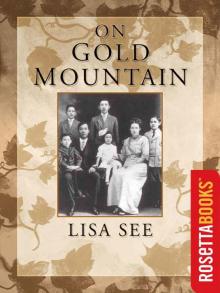 On Gold Mountain: The One-Hundred-Year Odyssey of My Chinese-American Family
On Gold Mountain: The One-Hundred-Year Odyssey of My Chinese-American Family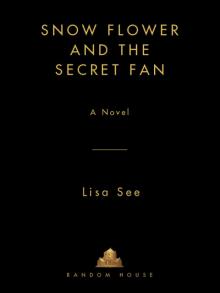 Snow Flower and the Secret Fan
Snow Flower and the Secret Fan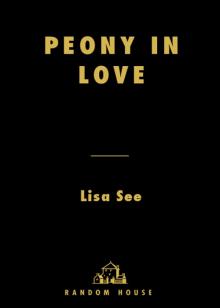 Peony in Love
Peony in Love Flower Net
Flower Net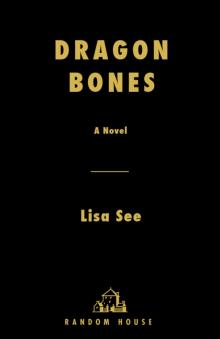 Dragon Bones
Dragon Bones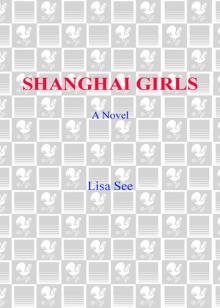 Shanghai Girls
Shanghai Girls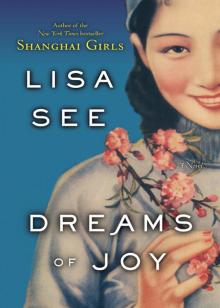 Dreams of Joy
Dreams of Joy The Island of Sea Women
The Island of Sea Women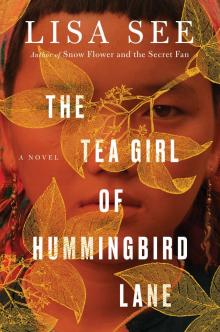 The Tea Girl of Hummingbird Lane
The Tea Girl of Hummingbird Lane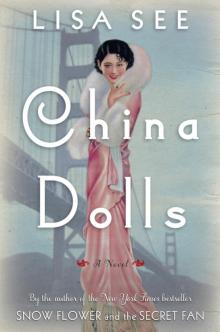 China Dolls
China Dolls The Interior
The Interior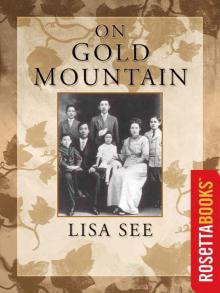 On Gold Mountain
On Gold Mountain